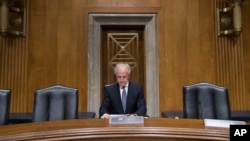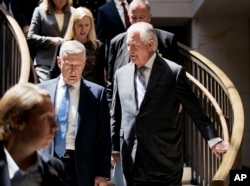U.S. lawmakers will grill top Trump administration officials on Monday about a new authorization for the use of military force in the campaign against Islamic State and other militant groups, Congress' most significant step in years toward taking back control of its constitutional right to authorize war.
Secretary of State Rex Tillerson and Secretary of Defense Jim Mattis will testify before the Senate Foreign Relations Committee at a hearing on the administration's view of a new Authorization for the Use of Military Force, known by the acronym AUMF.
Republican and Democratic members of Congress have been arguing for years that Congress ceded too much authority over the deployment of U.S. forces to the White House after the September 11, 2001, attacks. They are also divided over how much control they should exert over the Pentagon. Repeated efforts to write and pass a new AUMF have failed.
"As we face a wide array of threats abroad, it is perhaps more important than ever that we have a sober national conversation about Congress’ constitutional role in authorizing the use of military force," Republican Bob Corker, the chairman of the Senate Foreign Relations Committee, said in a statement.
Under the Constitution, Congress, not the president, has the right to declare war.
Concerns intensified this month after four U.S. soldiers were killed in Niger and previously over President Donald Trump's talk about North Korea and an attack on an airfield in Syria.
"What's happening in Niger and more broadly in Africa suggests a greater urgency for an AUMF," Democratic Senator Tim Kaine, a leading advocate for a new authorization, said on Thursday after a classified briefing on Niger.
Republican Senator John McCain, chairman of the Senate Armed Services Committee and the chamber's most famous war veteran, had said he might consider issuing a subpoena because the White House had not been forthcoming with details of the Niger attack and threatened to block Trump nominees. McCain has since said he is pleased with the information he is receiving and would let nominations go ahead.
Congress has not passed an AUMF since the 2002 measure authorizing the Iraq War. But the legal justification for most military action for the past 15 years is the older September 2001 AUMF, for the campaign against al-Qaida and affiliates.
Backers of a new AUMF say the 2001 authorization, which was not limited by time or geography, has let presidents wage war wherever they like, without spelling out any strategy for Congress, or the public.
For example, Islamic State did not exist when the 2001 AUMF was passed.
Trump's fellow Republicans control majorities in both the Senate and House of Representatives but there are deep divisions over any possible new authorization within the party, as well as between Republicans and Democrats.
Many Republicans, like McCain and Senator Lindsey Graham, do not want a measure exerting too much control over the Pentagon and say military commanders should decide how to fight America's enemies.
Many Democrats say they want an AUMF that limits why, where and for how long U.S. forces can be sent to fight.






